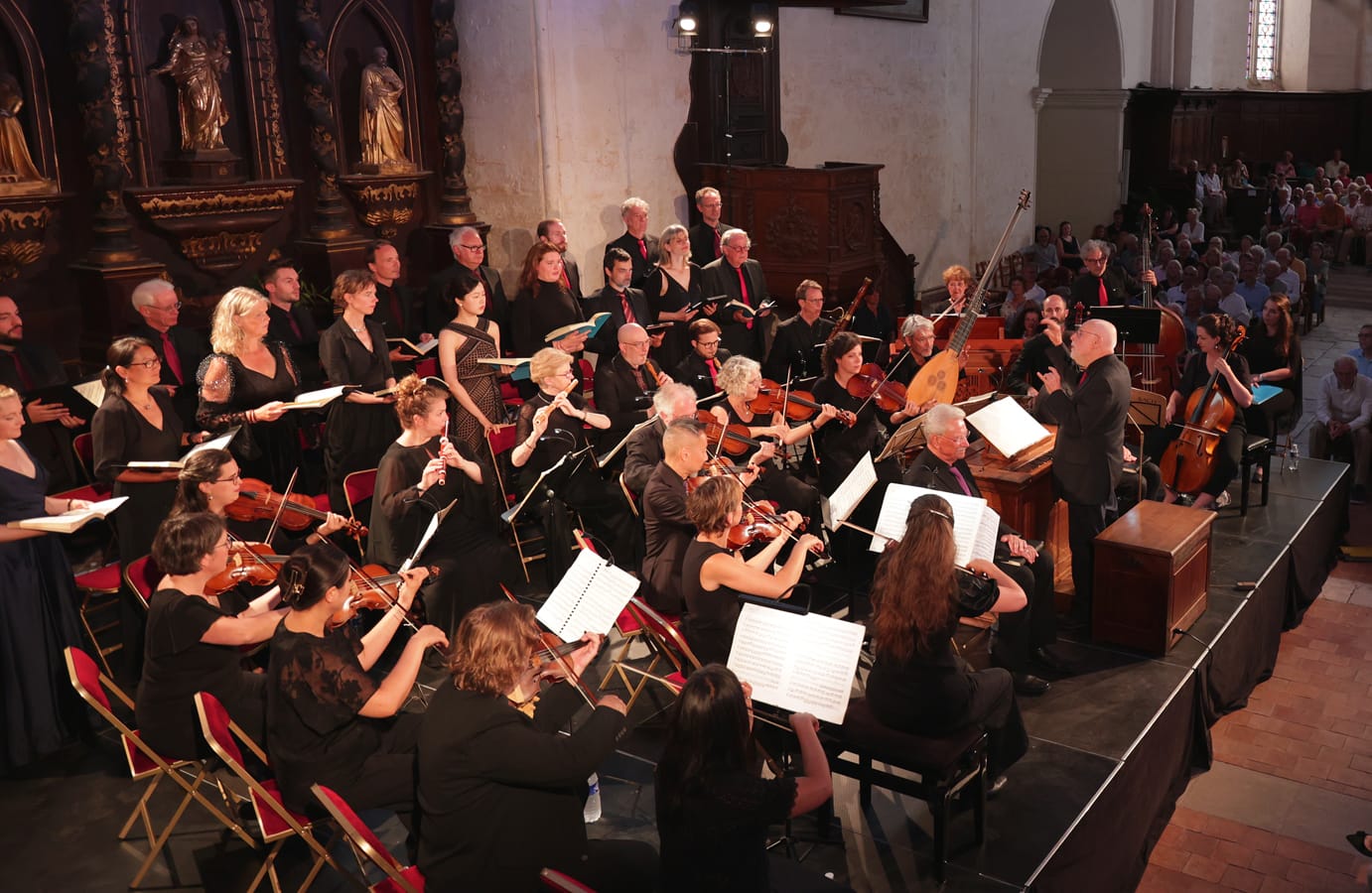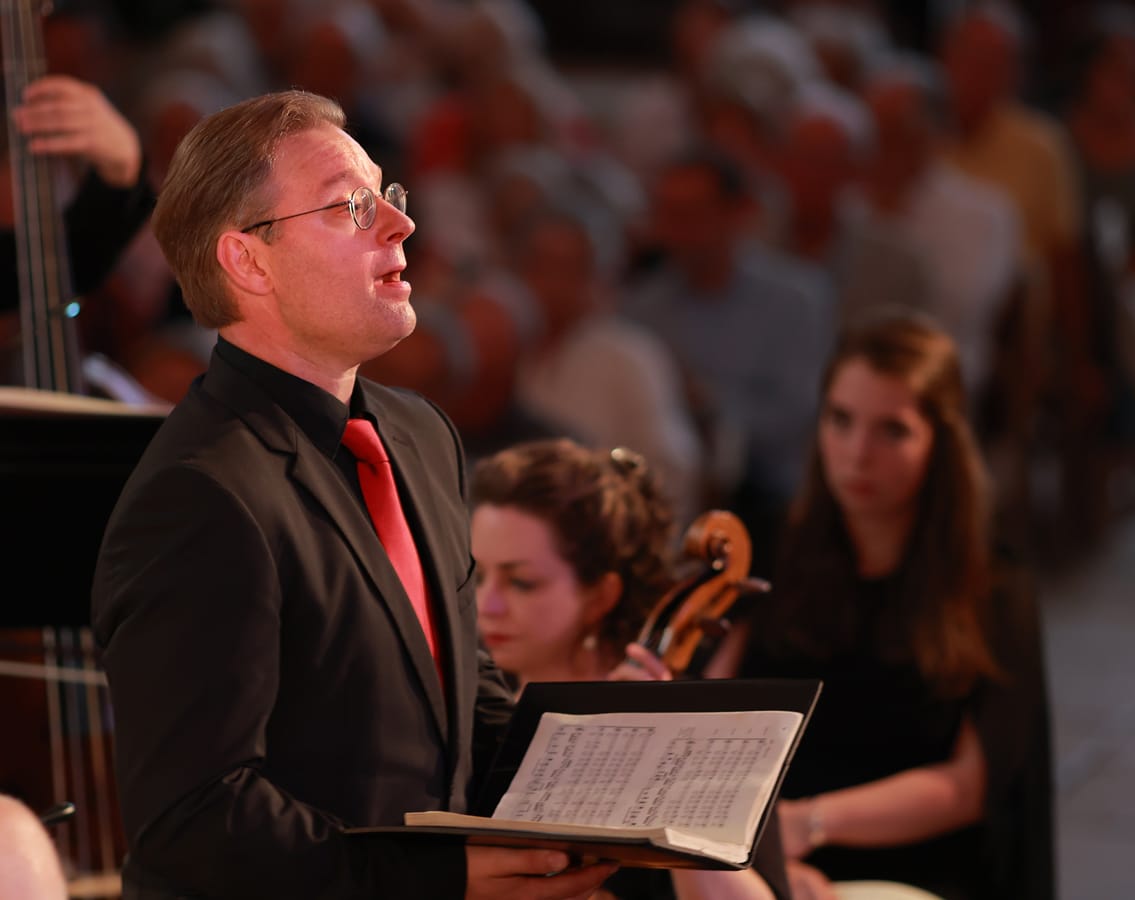
Itinéraire Baroque en Périgord, 2024: Bach Johannes-Passion, BWV 245 (1724). Amelia Berridge (soprano); Sophia Faltas (mezzo); Tilman Lichdi (tenor); Klaus Mertens (bass); Amsterdam Baroque Choir and Baroque Orchestra / Ton Koopman (conductor / harpsichord). Église de Saint-Astier, Dordogne, France. 4.8.2024
Ton Koopman is no stranger to the St John Passion: his 1993 recording (which also features Klaus Mertens as a soloist) has achieved notable status in the record lists. We are some way on from 1993 now, of course, and it was fascinating to hear Koopman’s most recent thoughts on Bach’s magnificent score (a score I, for one, rank above the St Matthew).
With age comes wisdom (Koopman celebrates his 80th next year – old age for most but kind of middle-aged for conductors: one anticipates a Günter Wand/Blomstedt-like decade or so of Indian Summer activity still). There was a tranquillity to Koopman’s St John Passion which overall gave the impression of a truly great performance although on the individual moment level, this could lead to a lessening of drama. There was strategy here, one immediately apparent in the opening chorus (‘Herr, unser Herrscher’). The initial tranche of woodwind dissonances had an effect, for sure, but not a touch on Suzuki’s immediately pre-pandemic St John at the Barbican (review). Koopman’s plan was broader: their return cut to the quick. This was his structural plan in microcosm: here is someone who hears the totality and plans accordingly. And how it worked. The Amsterdam Baroque Choir was superb throughout, the music in their blood as well as their throats, always expertly balanced, always immersed in the music, offering chorales of infinite solace: ‘Dein Will gescheh’’ from Part One was so carefully and lovingly sculpted, for example. Perhaps the second part micro-chorus ‘Nicht diesen sondern Barabam!’ and the later ‘Wir haben ein Gesetz’could have been clearer (the more clarity at source, the more chance of the projection to the back of the vast space).
Klaus Mertens, already heard to fine effect in the festival, was a brilliant Jesus, his every word clearly audible (in fairness, I was sitting near the stage: Saint-Astier is a vast space, and one that includes acoustic traps for the audience, although I imagine his projection found most places). But it was the Evangelist of Tilman Lichdi (a singer again heard earlier in the festival) that truly impressed. Not just the diction here, but the meaning of every word caried weight. This is a significant tale, he seems to be saying, a legend that holds much for humanity, if only we listen.

There was a last-minute substitution: soprano Elisabeth Brauer was replaced by Amelia Berridge, silver-voiced and clear (in the gorgeous ‘Zerfließe, mein Herze, in Fluten der Zähren,” with its sheaf of woodwind obbligato instruments allowing the Amsterdam orchestra to show its excellence)/ Berrridge also delighted in the lovely, light aria, ‘Ich folge di gleichfals’, garlanded by Kate Clark’s obbligato flute lines and negotiating the harmonically tricky moments easily.
Dutch mezzo/alto Sophie Faltas felt too quiet, though, particularly in ‘Von der Stricken’. The alto’s most poignant solo, though, is surely the Part Two ‘Es ist vollbacht,’ in which the soloist acts in partnership with the viola da gamba solo (Smith again). This was utter magic, two voices (only one with words) in perfect accord.
The orchestra was beyond criticism, Caroline Manson a superb leader, the expert Robert Smith (of whom I wax lyrical elsewhere in this festival report), Mike Fentross on lute and Tini Mathot on organ (with Koopman himself doubling function on harpsichord).
It is the choir that has the last words: am extended chorus (‘Ruht wohl’) followed by a chorus (‘Ach Her, laß dein lieb’ Engelien”. This passage, together over ten minutes, seem to sum up the consolation and utter serenity exuded by this performance. If this serenity was the underlay of everything so far, here it flowered, coming centre-stage to create a sonic plateau that transcended time and, surely, individual religions, taking us to a greater spirituality.
Simply magnificent.
Links below to streaming. I note the Japanese pressing of Koopman’s Erato recording is going for a mere £113.00, so I opted not to list that one! – good though Japanese pressing are. The physical copy is listed as unavailable, unfortunately.






%20Craig%20Fuller.jpg?w=160&resize=160,160&ssl=1)
